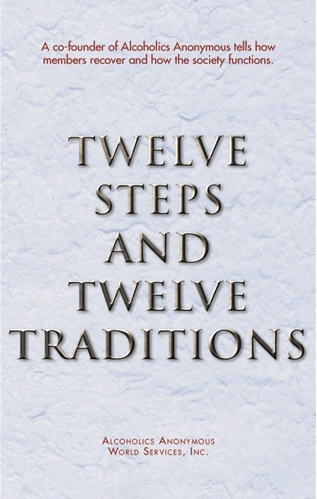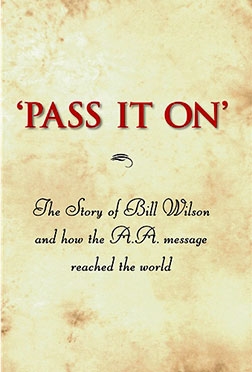$13.00
50 in stock
Description
Contents
Foreword 1 5
THE TWELVE STEPS
Step One
21
“We admitted we were powerless over alcohol—that our
lives had become unmanageable.”
Who cares to admit complete defeat? Admission of powerlessness is the first step in liberation. Relation of
humility to sobriety. Mental obsession plus physical allergy. Why
must every A.A. hit bottom?
Step Two
25
“Came to believe that a Power greater than ourselves
could restore us to sanity.”
What can we believe in? A.A. does not demand belief;
Twelve Steps are only suggestions. Importance of an open
mind. Variety of ways to faith. Substitution of A.A. as
Higher Power. Plight of the disillusioned. Roadblocks of
indifference and prejudice. Lost faith found in A.A. Problems of intellectuality and self-sufficiency. Negative and
positive thinking. Self-righteousness. Defiance is an out-
standing characteristic of alcoholics. Step Two is a rallying
point to sanity. Right relation to God.
Step Three
34
“Made a decision to turn our will and our lives over to
the care of God as we understood Him.”
Step Three is like opening of a locked door. How shall we
let God into our lives? Willingness is the key. Dependence
as a means to independence. Dangers of self-sufficiency.
Turning our will over to Higher Power. Misuse of will-
loading…
loading…
loading…
loading…
CONTENTS
10
our group conscience. Our leaders are but trusted ser-
vants; they do not govern.”
Where does A.A. get its direction? Sole authority in A.A.
is loving God as He may express Himself in the group
conscience. Formation of a group. Growing pains. Ro-
tating committees are servants of the group. Leaders do
not govern, they serve. Does A.A. have a real leadership?
“Elder statesmen” and “bleeding deacons.” The group con-
science speaks.
Tradition Three
139
“The only requirement for A.A. membership is a desire
to stop drinking.”
Early intolerance based on fear. To take away any alco-
holic’s chance at A.A. was sometimes to pronounce his
death sentence. Membership regulations abandoned. Two
examples of experience. Any alcoholic is a member of A.A.
when he says so.
Tradition Four
146
“Each group should be autonomous except in matters
affecting other groups or A.A. as a whole.”
Every group manages its affairs as it pleases, except when
A.A. as a whole is threatened. Is such liberty dangerous?
The group, like the individual, must eventually conform to
principles that guarantee survival. Two storm signals—a
group ought not do anything which would injure A.A. as
a whole, nor affi liate itself with outside interests. An ex-
ample: the “A.A. Center” that didn’t work.
Tradition Five
150
“Each group has but one primary purpose—to carry its
message to the alcoholic who still suffers.”
Better do one thing well than many badly. The life of
our Fellowship depends on this principle. The ability of
each A.A. to identify himself with and bring recovery to
CONTENTS
11
the newcomer is a gift from God… passing on this gift to
others is our one aim. Sobriety can’t be kept unless it is
given away.
Tradition Six
155
“An A.A. group ought never endorse, fi nance, or lend the
A.A. name to any related facility or outside enterprise,
lest problems of money, property, and prestige divert us
from our primary purpose.”
Experience proved that we could not endorse any related
enterprise, no matter how good. We could not be all things
to all men. We saw that we could not lend the A.A. name
to any outside activity.
Tradition Seven
160
“Every A.A. group ought to be fully self-supporting, de-
clining outside contributions.”
No A.A. Tradition had the labor pains this one did.
Collective poverty initially a matter of necessity. Fear
of exploitation. Necessity of separating the spiritual
from the material. Decision to subsist on A.A. voluntary
contributions only. Placing the responsibility of sup-
porting A.A. headquarters directly upon A.A. members.
Bare running expenses plus a prudent reserve is head-
quarters policy.
Tradition Eight
166
“Alcoholics Anonymous should remain forever non-
professional, but our service centers may employ special
workers.”
You can’t mix the Twelfth Step and money. Line of cleav-
age between voluntary Twelfth Step work and paid-for
services. A.A. could not function without full-time service
workers. Professional workers are not professional A.A.’s.
Relation of A.A. to industry, education, etc. Twelfth Step
work is never paid for, but those who labor in service for us
are worthy of their hire.
CONTENTS
12
Tradition Nine
172
“A.A., as such, ought never be organized; but we may
create service boards or committees directly responsible
to those they serve.”
Special service boards and committees. The General
Service Conference, the board of trustees, and group
committees cannot issue directives to A.A. members
or groups. A.A.’s can’t be dictated to—individually or
collectively. Absence of coercion works because unless
each A.A. follows suggested Steps to recovery, he signs
his own death warrant. Same condition applies to the
group. Suffering and love are A.A.’s disciplinarians. Dif-
ference between spirit of authority and spirit of service.
Aim of our services is to bring sobriety within reach of
all who want it.
Tradition Ten
176
“Alcoholics Anonymous has no opinion on outside is-
sues; hence the A.A. name ought never be drawn into
public controversy.”
A.A. does not take sides in any public controversy. Reluc-
tance to fi ght is not a special virtue. Survival and spread of
A.A. are our primary aims. Lessons learned from Washing-
tonian movement.
Tradition Eleven
180
“Our public relations policy is based on attraction rath-
er than promotion; we need always maintain personal
anonymity at the level of press, radio, and fi lms.”
Public relations are important to A.A. Good public rela-
tions save lives. We seek publicity for A.A. principles,
not A.A. members. The press has cooperated. Personal
anonymity at the public level is the cornerstone of our
public relations policy. Eleventh Tradition is a con-
stant reminder that personal ambition has no place in
A.A. Each member becomes an active guardian of our
Fellowship.
CONTENTS
13
Tradition Twelve
184
“Anonymity is the spiritual foundation of all our tradi-
tions, ever reminding us to place principles before per-
sonalities.”
Spiritual substance of anonymity is sacrifi ce. Subordinat-
ing personal aims to the common good is the essence of
all Twelve Traditions. Why A.A. could not remain a secret
society. Principles come before personalities. One hundred
percent anonymity at the public level. Anonymity is real
humility.
The Twelve Traditions—the Long Form
189
Hardcover, 192 pages




